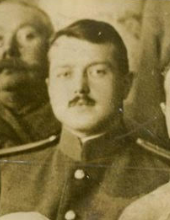
MARIA ROMANOV’S FIRST LOVE: “FATSO” NIKOLAI DEMENKOV
The scion of a noble family, who was always associated with the Fleet, Nikolai Demenkov was born on the first day of September, 1885. At 25, he graduated from the Marine Corps. His comrades always referred to him as “the benevolent Demenkov”. Shortly after his release from the Corps, he enlisted in the Black Sea Navy, and started going on international voyages on “The Kubanetz”. In 1913 he became a Flag Officer in the Mine Division, under the command of V. Trubetskoy. In July 1913 his division became security guard of Livadia. Demenkov commanded the boats that were close on duty to the Romanov family: guarding them when someone from “The Standard” went for a swim or kayaking.
“We were instructed not to make it obvious that we were there to protect them,” Midshipman Demenkov remembered. As he nervously climbed on deck of “The Standart” for instructions: “When I stepped off the plank, I saw the following picture, which I will never forget … The Grand Duchesses, laughing unreservedly, were playing one of their usual games with the officers of the yacht. … Before I could recover from embarrassment and put my hand to my hat in greeting, the game was interrupted for a few moments – noticing me the Grand Duchesses warmly and kindly welcomed me. Touching, soulful simplicity exuded from their greetings … Later fate deigned to allow me the happiness to witness this very charming simplicity many times – [it was] one of the main character traits of the imperial daughters”. Arguably, the most “simple” and most “good” among them was the Emperor’s third daughter – Grand Duchess Maria Nikolaevna.
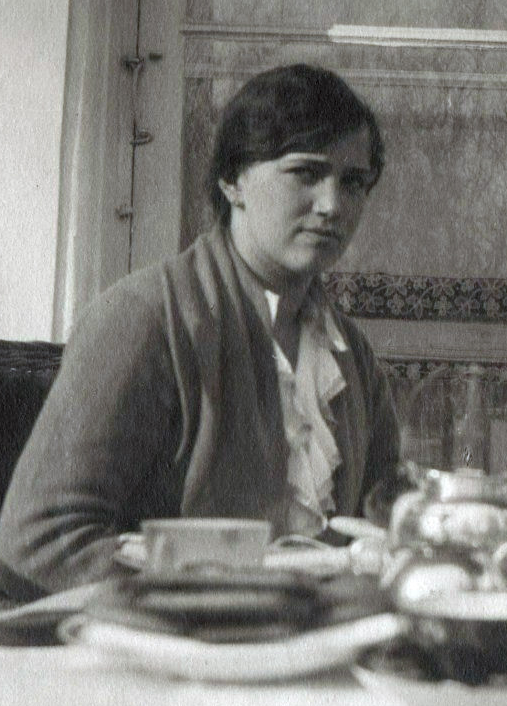
1913 and 1914, the two pre-war summers were full of idyllic images. Here were the Grand Duchesses, climbing aboard a security boat, endowing the entire team with lollipops (which, of course, were preserved as keepsakes). Here was the young Heir, asking to command the boat, and later defending Demenkov in front of his boss. Here was Tsar Nicholas II who decided to ride on a destroyer to Alushta, and the entire security team was concerned about his dinner aboard. “Tableware, variety of dishes, wines and so on were assigned to the immutable Flag Officer Trubetskoy, the lover of culinary arts, and also to the foremost gourmand Lieutenant Demenkov. ” However, all the preparations were in vain: the Tsar demanded a simple officer’s dinner. And with it he asked for beer, which – horror of horrors – was not on board. Demenkov had to source it from a nearby destroyer and send it in a box meant for classified documents.

Maybe it was this resourcefulness that impressed Nicholas II, or maybe his daughters had their input, but soon Demenkov was transferred from the Mine Brigade to the Svodny Regiment. Now he guarded the imperial Romanov family directly, and at the same time was involved in entertaining the grand duchesses.
Once during a game of tennis Nikolai Dmitrievich’s button came off his collar. “Her Imperial Highness Grand Duchess Maria Nikolaevna, noticing my involuntary embarrassment, with her characteristic kindness and simplicity deigned to come over to me and offer me the use of her handkerchief, which I clearly remember was white with a blue border which matched the white and blue dresses their Highnesses were wearing that day. The handkerchief served as a scarf around my neck and her Highness deigned to draw the Emperor’s attention to it”. Demenkov expressed an idea to Nicholas II: to make such cravats a compulsory part of the sport uniforms of the officers. But this was only done later, in immigration abroad. That summer they did not have a chance: The First World War broke out.

Demenkov remained at the imperial residence. By that time it was clear to everyone that Grand Duchess Maria was not indifferent to him, as it did not even occur to her to hide it. Maria even honestly expressed her feelings in letters to her father: “Demenkov, my darling, of course was not there…”; “We got very lucky during our walk – N.D. was on duty and we had a nice conversation with him through the window “; “Yesterday Voeikov was at church and from the distance he looked a bit like Nikolai Dmitrievich, how dare he, such a pig. “Ah! I hope that I will see my Demenkov at vsenoshnaya, but I’m afraid that [I will] not, as we are probably going to be standing in the prayer room, and we are too embarrassed to stand in church alone, and walk up to the New Testament.” “My Demenkov was very charming, and introduced all the [concert] performers to us.”
Grand Duchess Maria’s honesty did not make anyone uncomfortable – it was thought that she was still a child, and friendships with naval officers were even encouraged. Nicholas II, expressed his empathy in his letters to her: “I am glad for you that N.D. stayed at Tsarskoe Selo, but thus he lost his service at “The Rabotnik” Her sisters joked a bit more: “Maria was thrilled, because when we were leaving church, there stood the fatso Demenkov” – Grand Duchess Anastasia wrote. “Marie, of course, is as happy as a pug” – added Grand Duchess Olga.
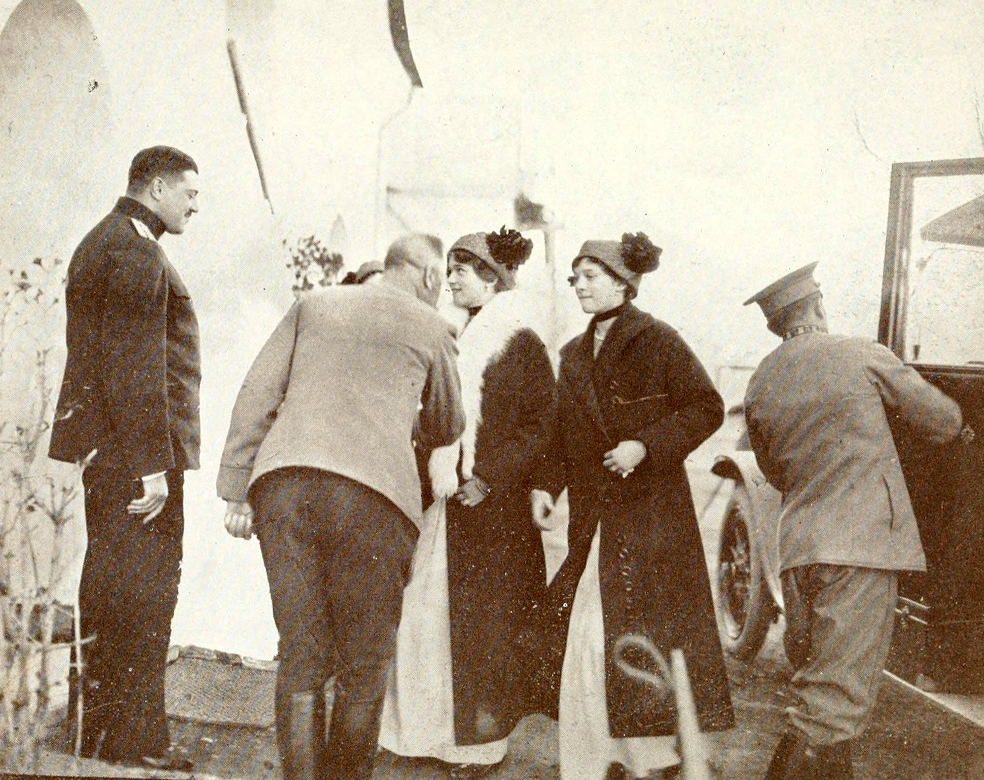
Grand Duchess Maria did not seem to be bothered or hurt by their jokes, while the “fatso” Demenkov himself seemed used to being ridiculed. Anastasia once told this story: “During tea at Anya’s yesterday we all sat on the balcony and it was very warm. The curtains were drawn because people were looking inside, but this one lady with a child in her arms was passing by and at this time we all went silent for some reason, and the boy said “Mama I want ah ah” and repeated it. We thought that no one heard but everyone heard and we were dying of laughter, [we] hooted for a long time, then went silent and then were dying again until everyone had tears [in eyes], while Demenkov did not hear anything and thought we were laughing at him, and then Viktor Erastovich explained to him [whispering] in his ear. ”
Such “teas at Anya’s” were part of regular entertainment for the grand duchesses. 3-5 officers chosen by the girls were always invited: their biggest “darlings”. The composition of the guests changed, but Demenkov’s name was almost always on the invitation list: “Everyone is going to Anya’s, who will have two Cossacks and Maria’s friend over”, Empress Alexandra wrote to her husband. “There were wounded friends of the children and Maria’s fatso.” “Ravtopulo, Shvedov, Yuzik, Zolotarev and, of course, Demenkov arrived there.” “Nikolai Dmitrievich was very funny, he was in charge of all the games, and at the end told two jokes,” – the grand duchesses reported. As for Maria, she only wanted to see him, her Demenkov: kind, sincere, shy and clumsy, much like herself.
Their innocent conversations through a window, meetings at church and merry games at Anya’s came to an end in the spring of 1916. On 9 March, the Svodny Regiment officers celebrated until morning hours: they were seeing off Nikolai Dmitrievich, who was returning to sea. Grand Duchess Maria sadly wrote to the Tsar: “Since then, I have not seen him and have no hope to … I talked to him on the telephone. He was very happy to go. Do you remember, I sewed him a shirt, well, I asked him and he said that it fits well.”
Indeed Grand Duchess Maria and her beloved “fatso” Demenkov, never saw each other again. He wrote to her quite regularly, and sent her photographs. Maria always shared his news with her father. Then came the Russian revolution. It is not known where Demenkov was at the time when Maria’s father, Tsar Nicholas II abdicated, and the Romanov family was placed under arrest.
We do know that in December of 1917, Nikolai Dmitrievich was seriously ill in Odessa: appendicitis was suspected, and he spent about five months waiting for surgery, and in fear of arrest. The lady-in-waiting Rita Khitrovo and other friends of the Romanov family were also in Odessa. In their letters, all four grand duchesses could not stop bombarding them with questions about “dear N.D.”: “Please convey our heartfelt greetings to N.D. from all of us. I hope his health is better”; responses like “Nik. Dm. works as an assistant of Lubasha’s husband. He lost weight – on a diet. He has not had the surgery yet. He sees Rita often, etc. He is very kind ” made them very happy. They often signed their letters to Odessa with “Regards to all of yours and Nik. Dm.”. Once Maria was even able to send him a postcard from their Siberian exile, which someone (could it have been Ritka Khitrovo herself?) brought to Demenkov from Tobolsk, reportedly “at risk of life” . Here it is:
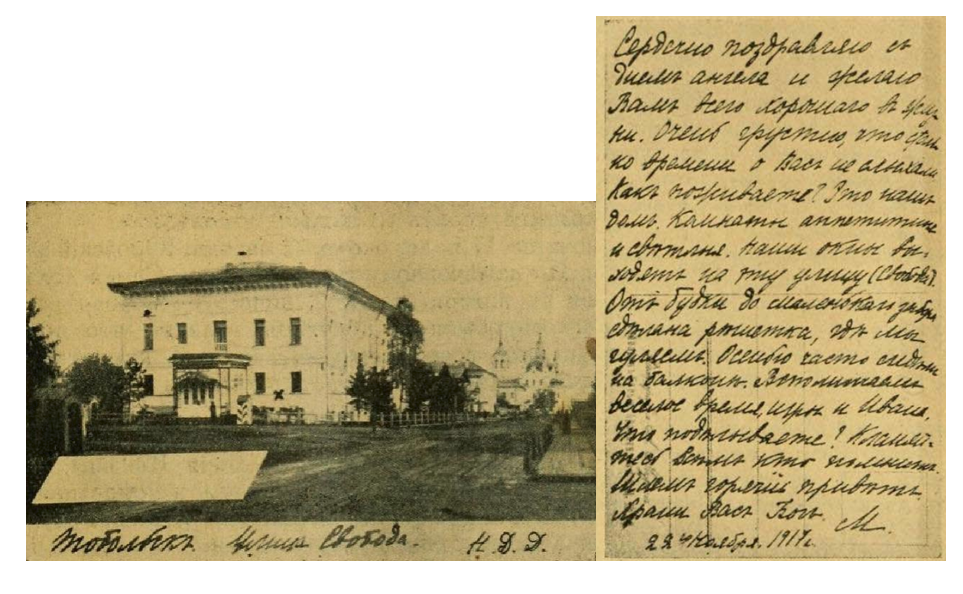
“Heartfelt wishes for [your] Day of the Angel and may you have all the best in life. So sad that we have not heard from you in so long. How are you? This is our house. The rooms are appetizing and bright. Our windows face this street (Freedom St.). They had set up bars from the booth to the little fence where we take walks. We sit on the balcony especially often. [We] reminisce about the happy times, the games, Ivan. What are you up to? Regards to all who remember us. We are sending warm greetings. May God keep you. M. 22nd November, 1917.”
A few months later, Nikolai Demenkov received devastating news: he learned of Maria’s death and that of the entire Romanov family. There was nothing left of them, nor of her, except a lollipop, a handkerchief, a shirt, a couple of cards, and a few happy days forever etched in his memory.
Having recovered from his illness, Demenkov joined the Southern Russian Armed Forces. In 1920 he was evacuated from Odessa on the steamer “The Gregory” to Constantinople, after which he moved to Paris, where he lived with his mother and cousin. In Paris, Demenkov worked as maître-d at several Russian restaurants: “Moscow Bells”, “Cabaret Novi” (where he also occasionally appeared as an actor), and “The Great Moscow Hermitage.” The latter was one of the most luxurious Russian restaurants of Paris.

When his coworkers and customers learned of their maître-d’s past history and his connection to the Romanov family, he became somewhat of a legend. Alla Bayanova, a budding actress of the thirties, remembered in her memoirs: “the maître-d was Nikolai Demenkov, the same man who was once the “dyadka” [sailor nurse] of the little Tsarevich Alexei, son of Nicholas II. When Alexei was feeling ill, he was sick with hemophilia, the sailor-nurse carried him and Demenkov was his mentor. And when his father gave the Tsarevich a small yacht, he did not exactly become its captain (as he had no time), but he was the commander of this yacht along with the Tsarevich.” Demenkov remained in Paris and worked as a maître-d until his death. The exile felt like a heavy and humiliating burden to him and he still existed in a parallel universe of memories, where he remained a senior lieutenant of the fleet, and a cavalier of several
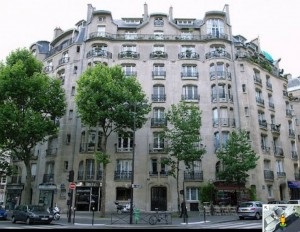
orders.
Nikolai Dmitrievich Demenkov died on 5 November, 1950. Until his death he continued to assist historians of the Fleet and other history scholars, and even gave the shirt sewn by Grand Duchess Maria to a museum in America. Later it was returned to Russia and is still kept in a museum there. Apparently, N.D. never married nor started a family. His obituary read: “The death of ND Demenkov is mourned not only by his former colleagues, but also numerous Parisian friends who loved and prized this wonderful man”.
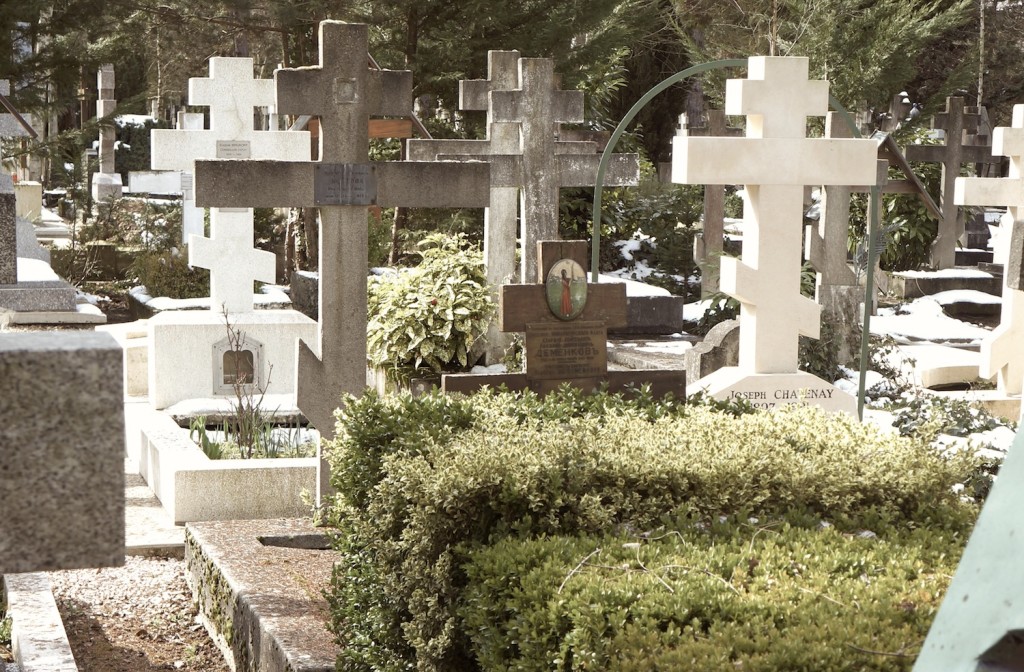
There are still people alive today who remember Demenkov. Possibly he used to look at old photograph albums and letters with them, almost not being able to believe that all that really happened. Like that yellowed piece of paper from another era, a postcard from his Grand Duchess: “In these words was so much affection, simplicity and uncomplaining humility! It was the last communication I received from her, who during her short life never caused any harm to anyone, but who fell as a sacrifice along with her whole family before the throne of God – for the sins of the Russian people …”
Maria Romanov’s writing quotes are from the book MARIA and ANASTASIA: The Youngest Romanov Grand Duchesses In Their Own Words: Letters, Diaries, Postcards.
Main Russian source: Мариин толстяк. Старший лейтенант Николай Деменков
2 thoughts on “MARIA ROMANOV’S FIRST LOVE: “FATSO” NIKOLAI DEMENKOV”
N.D. in Paris same building as DeBobrikov family and Count Oblenski?
Anastasia
N.D in Paris same building as DeBobrikov family and Count Oblenski ?
Anastasia